Holistic Cure – Holistic Treatment
The methodology explained
Homeopathy – Herbs – Acupuncture – Chiropractic – Holistic Medicine – Natural Feeding
Over the years, we have come to realise that, when an animal is ill, only three factors affect the chances of recovery, no matter which therapy or treatment is used. You will notice that the supposed ‘name' of the ‘disease' is not in the list. The holistic vet takes greater cognisance of the patient than of the disease name. The disease name itself is a poor indicator of prognosis and the reason for that lies in the three factors:
 1. Has the animal the mechanism and the will to heal? Clearly, we are unable to find a true cure* for a condition that has destroyed tissue which the animal cannot repair (e.g. kidney tissue). Conversely, despite what may seem like a hopeless prognosis in many cases, the animal can overcome some of the most frightful diseases, given the right help (as below). In theory, this element is beyond our control but we can favourably influence the will to live and the healing energy by applying TLC (tender loving care!) and keeping a positive attitude.
1. Has the animal the mechanism and the will to heal? Clearly, we are unable to find a true cure* for a condition that has destroyed tissue which the animal cannot repair (e.g. kidney tissue). Conversely, despite what may seem like a hopeless prognosis in many cases, the animal can overcome some of the most frightful diseases, given the right help (as below). In theory, this element is beyond our control but we can favourably influence the will to live and the healing energy by applying TLC (tender loving care!) and keeping a positive attitude.
2. Has the prescriber the ability and insight to find the correct stimulus for that ability? Here we are seeking an appropriate stimulus for each individual patient, rather than an ‘off-the-shelf' formula or ‘one size fits all'. The indicators come in the animal's personality, demeanour, build, appearance, behaviour, and signs or symptoms detectable wherever in the body. The stimulus we are seeking may be homeopathy, acupuncture, herbal medicine, chiropractic manipulation or combinations and permutations of these and other therapies, that best suit the individual patient and the clues that we can ascertain. We hope (and aspire), as experience accrues, that we continue to improve in our ability to read the clues and to ascertain and to apply the best healing stimulus.
3. Has the animal's care team (i.e. family and prescriber) the determination and clarity of thought to track down and eliminate all possible obstacles to recovery or cure*? These are the things that can obstruct the healing process that we are trying to encourage and stimulate. Here we require an understanding of each species and the challenges that are peculiar to it. We need to be very detailed in our enquiry and observant n our examination of lifestyle, environment, management, activity, diet and the many other factors that may impinge on the particular patient. This is the holistic approach. While the clinician can be very helpful in bringing experience and knowledge to the table, flagging up the salient points, it is incumbent upon the animal's human companions to put into action the required modifications that are highlighted at this stage.
*We have used the word ‘cure', since apparent cure is a practical possibility, even in chronic disease, since any improvement is a result of the body's own healing responses at work, not an artificial product of a pharmacological agent. In other words, cessation of signs and symptoms indicates that the body has rid itself of the disease, whereas a pharmacological agent (e.g. drug) can only produce diminution of signs and symptoms through direct suppression of them, for possible reappearance at a later date.
If all the above three factors are favourable, then the likelihood of cure is high, whatever the name of the disease. For this reason, we are rarely pessimistic at the outset of a case.
The Alternative Vet (AVMC) offers Holistic Veterinary Medicine:
Holistic Horse Holistic Pony Holistic Dog Holistic Cat Holistic Farm
At the AVMC, the holistic vet uses exhaustive holistic methodology, with integrated alternative and complimentary medicine methods. Chris Day, holistic vet, vet homeopath, vet herbalist and vet acupuncturist has more than 40 years of experience in the field and is willing to share experiences, understanding and ideas with veterinary colleagues, veterinary students and animal ‘owners'. He offers holistic veterinary advice for each and every patient.
Note: Sometimes, we are asked just to treat one of a horse's (or other animal's) problems and not to bother about whatever else may be wrong or that we might find at the examination. This is not possible, using holistic methodology and therapies such as acupuncture or homeopathy, in that it is the horse (or cat, dog, pony or other animal) that we are treating, not one of the symptoms or signs of disease. The entire symptomatology at the time helps to build the patient picture required by the holistic vet. We treat the horse himself and the horse is the one who does the healing.
Hippocrates is credited with saying that: ‘The physician treats, Nature heals‘.
This means that we cannot target one specific part of the picture, nor should we leave correctible problems unattended (e.g. bad back, ill-fitting saddle, bad shoeing etc.), as these will impede the healing process.
Synonyms: ‘Holism' and ‘Holistic' are sometimes written ‘Wholism' and ‘Wholistic'.
N.B.: When a case is referred to us, it is much more helpful to receive the entire medical history, rather than selected detail from it. The holistic methodology and treatment are more effective, when based on the full medical history.
